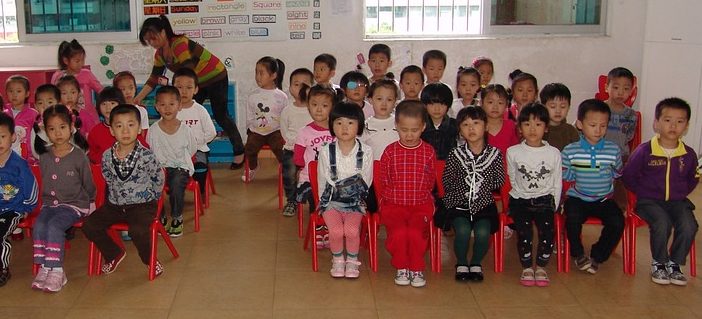Education for children is a tricky topic for expats who are non-teachers. The price of international education is incredibly expensive, under normal circumstances, and it’s hard to find high quality schools on a budget. Most non-teacher parents have weighed the question of whether to enroll children in a small, local Chinese private kindergarten, but I have a few words of caution for that. I personally regret sending my son to a small private kindergarten. Our reason was to make the transition into his current school easier language-wise, and though we accomplished that, I wish I had been a stronger advocate when I felt the classroom wasn’t quite right.
1 – Adjusting to Language is Hard
My son went from an all English-speaking environment to a totally Chinese-speaking environment. He was young, so he picked up on the language quickly, but it was difficult for him nonetheless. Chinese as a Second Language is still a budding field of education in China, and most private local kindergartens are not equipped to help foreign children make this adjustment. A worry that we have now even at our reputable school is that our children’s Mandarin language is not supplemented as well at home, meaning that their academic language won’t match their peers, making it hard for them to keep up with their homework and classwork.
2 – School Culture is not the Same
In my opinion, setting rules and following through on appropriate discipline is a weak area for Chinese kindergartens. Parent and teacher communication is also difficult – teachers are not comfortable in expressing negative news from the classroom. I think there are many reasons for this. One, teachers are fearful of parents. Secondly, beyond the basic requirements for teachers of a school’s license, it’s up to the discretion of each kindergarten to decide basic qualifications for teachers. Many teaching assistants in the classroom have a two year technical school training only. The in-class ayi roles are typically filled by those who have completed Chinese compulsory education. Head teachers also need to complete technical training as teachers, but to obtain a teacher’s certificate, they need only to pass a test, a 10-minute lesson plan observation, and an interview. In comparison, US public teachers require a Bachelor’s degree in Education or double-major, a time period of student-teaching observed by an experienced professional in the field, passing four tests per area of license, and periodic updating of their licenses. Some states require Master’s degrees.
3 – Parent Involvement is Expected
Most Chinese families with young children have four adults at home, and so local schools will often prepare events where parents are expected to take time off work or send the grandparents to participate. Our local kindergarten required four parent visit events per semester during the work week. In comparison, our current school has one to two events per semester during the work week, with a few weekend events. Since both my husband and myself worked as teachers during this time, I couldn’t make it to all of his events. His reaction was always, of course, to cry, so teachers would tell me, and that gave me major mom guilt.
4 – Flying Under the Radar
In my search for local provision, I stumbled across a small kindergarten held in a random apartment in our neighborhood complex. It didn’t feel right, and I’m glad I trusted my gut. Now that I know more about education laws in China, daycare run out of a national’s “home” doesn’t need a license. Who then regulates teacher credentials? Who then is the authority that steps in if something goes wrong? Foreigners have a hard time advocating for their rights in China, let alone when treading in murky waters. Even if one parent has to stay home to homeschool, this would be better than putting a child in this sort of situation.
5 – Safety Over Health
I was taken aback when the teachers at my son’s former local kindergarten preferred not to have air filters because they were worried the children’s fingers would get chopped off or hurt if stuck in the grates (that was impossible). But this type of thinking runs deep. Children can’t run, climb, or do anything that would put them in the slightest bit of danger because of teacher fear of parent lawsuits.
6 – Make Friends, Keep Friends
Unfortunately, socialization in class might not be enough for your child to adjust to the classroom. My son did well to make friends in his class, but my daughter has really struggled, even at the school where I’m happy she is at. She struggled more with language and likes to play mischievous jokes, which her little brother finds hilarious when played on him, but Chinese children typically do not like it at all. We needed to bring friends to our house to observe her playing with her classmates in order to help her improve and have “friends” in class.
7 – Translator Always Needed
We received notes after notes, and WeChat messages buried in parent chat groups, that we just couldn’t understand. We always needed to find a translator to help us understand what was being said and what was being required. I really feel that for parents who do not have local, bilingual friends, this aspect of going to a Chinese kindergarten alone would make this type of school choice impossible.
There are, of course, benefits to going to a Chinese kindergarten, but I would suggest parents be very prepared for these challenges. Otherwise, you can search out the international schools that offer scholarships, or start considering a career in Education. If you can manage to pull the cost of international tuition, I would suggest doing so! Here’s a link to the most recent School Choice Guide.

More stories by this author here.
Email: vanessajencks@truerun.com
Twitter: @vanessa_jencks
WeChat: vanessajencks




